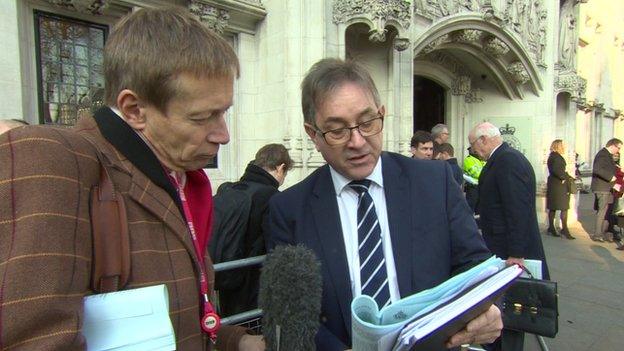Welsh Government claims 'victory' in Brexit case
- Published
- comments

'It's certainly a victory' - Counsel General Mick Antoniw explains his view of the Supreme Court judgement to me.
As victories go, there have been more obvious triumphs.
Eleven Supreme Court judges unanimously rejected the Welsh Government's argument for AMs to be consulted before the UK government triggers Article 50 and formal divorce talks with the European Union.
The judges said the Sewel convention, although important for harmonious relationships between Westminster and devolved governments, is not a matter for the judiciary.
And it said that relations with the EU are a matter for the UK government.
'Sovereignty'
But the Welsh Counsel General Mick Antoniw was clear as he emerged from the court:
"It's certainly a victory because it does two things. Firstly it upholds the sovereignty of parliament in terms of the government having now to bring a Bill to parliament on Brexit, which opens an opportunity to engage through the Sewel convention.
"We've never argued for a veto and the court made that point in terms of Sewel but what it did do was stress the importance of the Sewel convention as a process of engagement and I think that gives us strong comfort in terms of the arguments we made in the court being accepted by the Supreme Court today."
'Compulsion'
Under the Sewel convention, Westminster doesn't normally legislate in devolved areas without the consent of AMs. But if the judges have ruled that relations with the EU are reserved to the UK government, will the convention apply?
Although they may be no legal compulsion to consult AMs, MSPs or MLAs, politically they will be consulted, even if there is frustration in Cardiff, Belfast and Edinburgh at the nature of that consultation.
Brexit Secretary David Davis told MPs: "The Supreme Court has ruled clearly in the government's favour on the roles of the devolved legislatures in invoking Article 50.
"But while this provides welcome clarity, it in no way diminishes our commitment to work closely with the people and administrations of Wales, Scotland and Northern Ireland as we move forward with our withdrawal from the European Union."